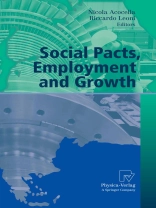Social pacts have long been a centerpiece of European politics. They are characterized by negotiations among government, employers, workers, and other interest groups over wages and other economic issues. With the growth of globalization, some economists have called for a reduced role of social pacts and centralized wage bargaining, to be replaced by increased flexibility in labor agreements; others argue in favor of social pacts. In this book leading European economists examine the current status of social pacts and their future. Particular focus is placed on the role of trade unions, and the positive role they can play for economic and social stability by agreeing to set wages on the basis of a target rate of inflation. This was the argument of Ezio Tarantelli, a young Italian economist killed by Red Brigades in 1985. As the European Union expands and social change accelerates, this insightful book will be of interest to all concerned with social and economic developments across Europe.
Table des matières
Globalization, labor markets and welfare states: a future of “competitive corporatism”?.- Social Pacts in Tarantelli’s Thought.- ‘Doing good’. Ezio Tarantelli’s Approach to Political Economy.- The 1960s and Ezio’s Awakening to the Social Problems of Italy.- The Implementation of Tarantelli’s Proposals.- Employment Growth in Italy in the 1990s: Institutional Arrangements and Market Forces.- The July Protocol and Economic Growth: The Chance Missed.- The’ 93 July Agreement in Italy: Bargaining Power, Efficiency Wages or Both?.- Social Pacts in Europe.- Wage Bargaining Institutions in Europe. A Happy Marriage or Preparing for Divorce?.- Industrial Relations and Macroeconomic Performance.- Wage Setting Institutions and Economic Performance.- Loops Learning and the Phillips Curve.- Wage Inequality in Europe: the Role of Labour Market and Redistributive Institutions.- For a Theory of Social Pacts.- Searching for the EU Social Dialogue Model.- From First- to Second-Generation Social Pacts.- Alternative Solutions to Conflicts.- Inflation Inertia, Monetary Policy and Market Competition: Tarantelli Revisited.- Creating the ‘Neo-Lisbon’ Economy.












